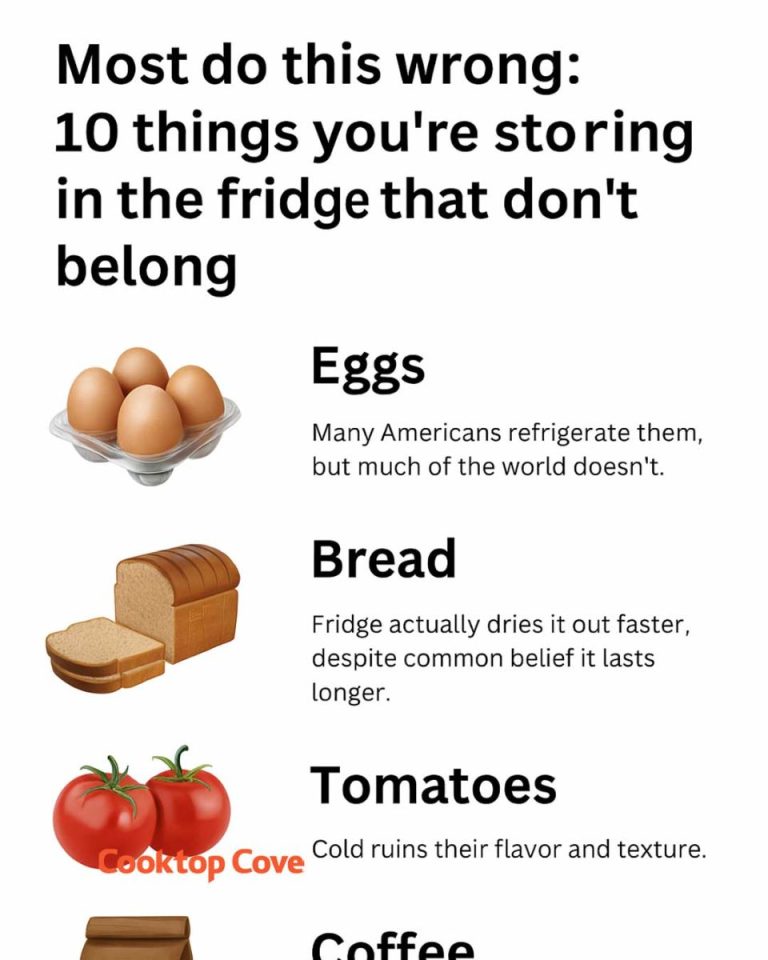Many of us are guilty of overloading our refrigerators with items that don’t actually need to be stored there. In fact, some foods can lose their flavor, texture, or nutritional value when kept in the cold. Understanding which items are better off stored elsewhere can help you make the most of your groceries and reduce food waste.
In this article, we’ll explore ten common items that are often mistakenly stored in the fridge. By learning the proper storage methods, you can ensure that your food stays fresh and delicious for as long as possible.
1. Eggs: Why Room Temperature is Better
While it’s common in the United States to refrigerate eggs due to the washing process that removes the protective cuticle, in many parts of the world, eggs are kept at room temperature. This is because eggs can maintain their freshness for up to three weeks without refrigeration if they are unwashed. Keeping eggs at room temperature can also improve their cooking qualities, particularly for baking, where room temperature eggs blend more easily into batters.
2. Bread: Keep It Fresh on the Counter
Storing bread in the fridge might seem like a good way to keep it fresh, but it actually speeds up the staling process. The cold temperature causes the starches in bread to recrystallize more quickly, leading to a dry, hard loaf. Instead, keep bread at room temperature in a bread box or a paper bag to maintain its moisture and texture. For longer storage, consider freezing bread, which can preserve its freshness for up to three months.
3. Tomatoes: The Case for the Pantry
Refrigerating tomatoes can alter their texture and flavor, making them mealy and less sweet. Tomatoes are best stored at room temperature, ideally in a single layer, stem side up, to prevent bruising. This allows them to ripen naturally, enhancing their taste and juiciness. Once fully ripe, they can be consumed within a few days for optimal flavor.
4. Coffee: Preserve the Flavor in the Cupboard
Coffee beans and grounds are highly absorbent and can take on odors from other foods in the fridge, which can affect their flavor. Additionally, moisture in the fridge can cause coffee to spoil more quickly. To keep your coffee fresh, store it in an airtight container in a cool, dark place, such as a cupboard. This will help preserve its aroma and flavor for up to two weeks.
5. Potatoes: Avoid the Fridge for Better Texture
Cold temperatures can cause the starches in potatoes to convert to sugar, resulting in a sweet taste and gritty texture. Instead, store potatoes in a cool, dark, and well-ventilated area, such as a pantry or cellar, where they can last for several weeks. Avoid storing them near onions, as the gases emitted by onions can cause potatoes to spoil more quickly.
6. Onions: Store in a Cool, Dry Place
Onions need air circulation to stay fresh, so they should be stored in a cool, dry place, like a pantry, in a mesh bag or basket. Refrigerating onions can make them soft and moldy due to the moisture in the fridge. Once cut, however, onions should be stored in the fridge in a sealed container to prevent odor transfer and spoilage.
Most do this wrong. 10 things you’re storing in the fridge that don’t belong

Pages: 1 2